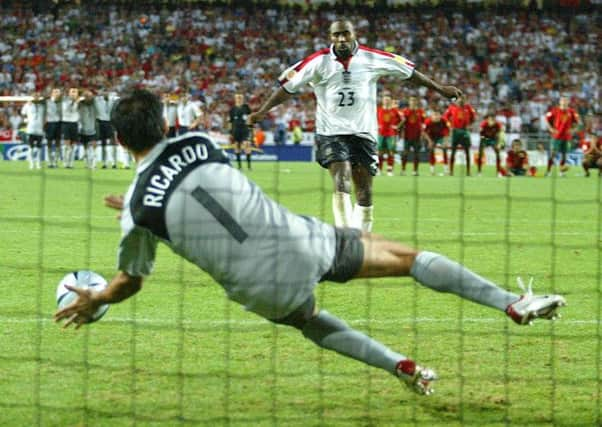England to try mind games in bid to avoid heartache


It is easy to spot what links them, for England football supporters, at any rate: they are the venues for the Three Lions’ penalty failures in major competitions.
While the English ‘disease’ of football hooliganism abroad has thankfully died out, the curse of shoot-out defeats still scars the national psyche.
Advertisement
Hide AdAdvertisement
Hide AdEngland have departed six of their past 10 international tournaments on penalties and, all told, have lamentably won just once in eight shoot-outs, against Spain at Wembley in Euro 96.
A further exit by that tortuous route in Brazil in late June – early July if we are lucky – seems as inevitable as strawberries and cream at Wimbledon.
Practice did not make perfect in the Three Lions’ last episode of woe when Roy Hodgson’s side bowed out 4-2 on penalties to Italy in the European Championship quarter-final in Kiev in June 2012, despite repeated training drills.
Now the meticulous Hodgson is taking a more cerebral approach, enlisting the support of experts in sports psychology in an attempt to banish the penalty curse.
Advertisement
Hide AdAdvertisement
Hide AdHe will take former World Cup-winning rugby union coach Dave Reddin – an expert in strengthening sportsmen’s mind-sets – as part of his backroom staff in Brazil and has also invited cycling performance director Sir Dave Brailsford to speak to his players prior to the tournament.
These are moves which are long overdue, according to one leading Yorkshire sports psychologist.
As part of his job as a golf psychology consultant to the PGA, Jon Finn teaches young golfers how to deal with intense situations and not ‘choke’ under pressure, something all sportsmen and women have to deal with.
Finn, who previously worked in professional football for five years as a consultant for sports performance analysis company ProZone, wrote an article last year on the physiological issues facing England players when they take penalties in major tournaments.
Advertisement
Hide AdAdvertisement
Hide AdHe has developed a programme training golfers to think correctly under pressure, which teaches them to control the words they are saying in their heads and the images they are seeing in their mind’s eye when performing a given skill – and feels it is transferable to footballers, more specifically in the penalty shoot-out arena.
He said: “It’s hard to practise performing under pressure, that’s the problem. You have to practise what you are thinking about.
“The human brain is a threat-detection mechanism, it’s designed for survival. The first thing the brain is interested in is physically violent threats and the second thing is what we call social status threats. In layman’s terms, it’s the brain wanting you not to look bad in front of other people.
“Taking penalties and golf shots are really good opportunities to make yourself look bad in front of other people.
Advertisement
Hide AdAdvertisement
Hide Ad“That’s why pressure has such an impact on people who are deemed to be experts at taking penalties or hitting golf balls.
“It just unravels their ability to do it as it completely changes what their brain is paying attention to, which is, ‘Don’t mess it up, don’t miss it, don’t underhit it’.
“These skills are very hard to perform under pressure; what you have to work out is how to help someone do it under pressure.”
England’s two leading players who head out to Brazil, in captain Steven Gerrard and striker Wayne Rooney, have experienced the disappointment of penalty elimination three times in major tournaments, with the former missing in the World Cup quarter-final penalty shoot-out loss to Portugal in Gelsenkirchen in 2006, when only Owen Hargreaves scored in a 3-1 loss.
Advertisement
Hide AdAdvertisement
Hide AdThe majority of the England squad who lost to Italy on spot-kicks in Euro 2012 are also likely to be on the plane bound for Brazil this summer and Finn feels that sports psychologists should be holding sessions with all the Three Lions on a regular basis from now to throughout the tournament’s duration, with it not being a case of a few ‘mind clinics’ on penalties here and there.
He said: “There’s a massive stigma in football in terms of what psychology is and isn’t. I am glad Roy Hodgson is talking about it.
“In terms of penalties, it’s about getting experts who help players really control how they are going to think as they kick a football.
“I know for a fact Germany and Holland spend more resources in this (sports psychology) area than we do in England.
Advertisement
Hide AdAdvertisement
Hide Ad“But when you are an England player, you know when the call for a penalty comes you have 20 or 30 years of history on your shoulders. So you are already significantly disadvantaged.
“Broadly-speaking, the other European nations have an advantage against England when they compete against England at penalties as they understand how horrific the England record is. So England have to work doubly hard to get on an even keel with those nations.
“The important thing for the players and managers is not to underestimate how much detail they are going to have to go into this to really ‘nail it’ at last. It’s not a quick-fix solution.
“Dave (Brailsford) employs psychologists as much as any sports performance director. But one hit isn’t going to solve the problem; it needs that continual exposure in training.
Advertisement
Hide AdAdvertisement
Hide Ad“Ideally, England want to be employing someone to go around the clubs and be working with those players on how they think when they take a penalty and practise.
“These players are like movie stars and they need that script in their head of exactly what they are going to be saying to themselves as they kick the ball.”